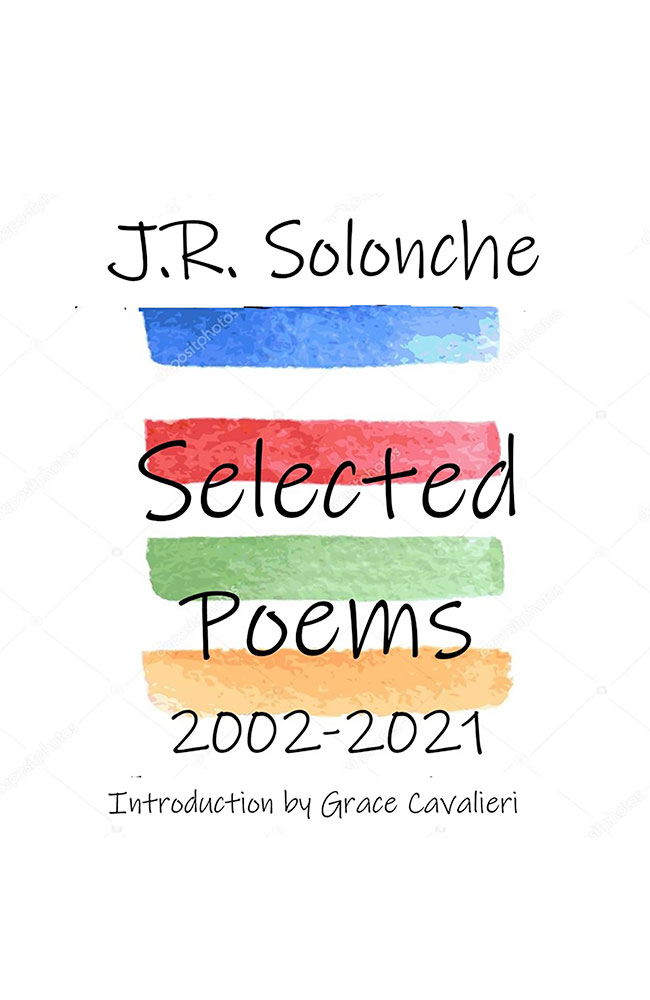Publishers of international
prose, poetry, art,
and literary hybrids.
Book
J.R. Solonche Selected Poems 2002-2021
Although J.R. Solonche started placing poems in magazine, journals, and anthologies in the early 70s, his first book of poetry, Peach Girl: Poems for a Chinese Daughter, co-written with his wife, did not appear until 2002 and his own first collection, Beautiful Day, not until 2015. Just this March, Years Later, his twenty-second book, was published. That’s a lot of books, too many for most readers to buy. But they don’t have to. They can buy just one. It’s his twenty-third. Selected Poems: 2002 – 2021 is a generous offering of his favorite poems from most of those books, including the two nominated for the Pulitzer Prize, Invisible (2017) and Piano Music (2020) and the 2020 Shelf Unbound Notable Indie Book, The Porch Poems. In her introduction to Selected Poems: 2002-2021, Grace Cavalieri says, “The absolute best remark I can make about this book is that I would give it to non-readers of poems as a conversion to poetry, for its language is as available as rain; hopeful as sunshine; and fresh as the wind. It’s a perfect book to let the reading public know that this is America’s poetry. This is a serious book disguised as playfulness, and we are its lucky recipients
Author: J.R. Solonche
Paperback : 440 pages
ISBN-10 :
ISBN-13 : 978-1-947175-51-8
About the Author
J.R. Solonche has published poetry in more than 400 magazines, journals, and anthologies since the early 70s. He is the author of Beautiful Day (Deerbrook Editions), Won’t Be Long (Deerbrook Editions), Heart’s Content (Five Oaks Press), Invisible (nominated for the Pulitzer Prize by Five Oaks Press), The Black Birch (Kelsay Books), I, Emily Dickinson & Other Found Poems (Deerbrook Editions), In Short Order (Kelsay Books), Tomorrow, Today and Yesterday (Deerbrook Editions), True Enough (Dos Madres Press), The Jewish Dancing Master (Ravenna Press), If You Should See Me Walking on the Road (Kelsay Books), In a Public Place (Dos Madres Press), To Say the Least (Dos Madres Press), The Time of Your Life (Adelaide Books), The Porch Poems (Deerbrook Editions , 2020 Shelf Unbound Notable Indie Book), Enjoy Yourself (Serving House Books), Piano Music (nominated for the Pulitzer Prize by Serving House Books), For All I Know (Kelsay Books), A Guide of the Perplexed (Serving House Books), The Moon Is the Capital of the World (Word Tech Communications), Years Later (Adelaide Books), The Dust (Dos Madres Press), and coauthor of Peach Girl: Poems for a Chinese Daughter (Grayson Books). He lives in the Hudson Valley.
[His] work is varied in its aims and form (the ghazals, sonnets, and anaphora poems stand out), though united by a pithy, sardonic voice that can achieve playfulness, profundity, and mystery in the same breath. I admire their fearlessness and honesty.
— Joshua Coben
All too often, reading a modern poem can feel a bit like wading through quicksand. Then along comes Solonche, whose breezy, accessible style feels more like sprinting across the surface of a still lake. Even his shortest poems are brimming with wit and generosity, and I’ve yet to read a single one of his books that didn’t feel like a bright, perhaps undeserved gift to the bookshelves of America.
— Michael Meyerhofer, author of Ragged Eden
Many times, poets with as many books under their belt as Solonche tend to assume a sage-like persona, presenting themselves as the wise old bard who has the answer to your every question about the universe—including that murkiest thought in the hindquarters of your brain—tucked conveniently up their sleeves. You can practically feel their feet lifting off of the ground as they imagine themselves hovering just a few inches above the rest of man and womankind. The glory of J.R. Solonche is that, over the course of his career (read: over the course of his life) he has been consistently able to keep his feet firmly on the ground.He achieves this through humor. He achieves this through quirkiness. He achieves this through self-deprecation. And sometimes he achieves this through a combination of the three.
— Stephen Cramer is the winner of the National Poetry Series and the Louise Bogan Award
According to Lord Polonius in Hamlet, “brevity is the soul of wit.” In the poetry of J. R. Solonche, brevity, soul and wit co-exist superbly. Start with any of his poems. You’ll find, unlike much of what is written these days, the wit is never far from the surface. As for the brevity, imagine an appetizer that’s as filling as a main course. And, after the meal, after the laughter, the soul will be what lingers.
— John Grey, author of What Else Is There, Main Street Rag’s Editor’s Poetry Series
Solonche is productive and prolific, but that doesn’t water down his poetry… He can compress a philosophical treatise into three lines… His epigrammatic tidy poems are philosophic gems. Solonche sees humor and encapsulates it; he frames a thought in perfect verse… He’s playful and profound — the more he writes, the more he seems to know. Beneath the Solonche simplicity are significant social comments, and his goodwill reinforces the best in us.
— Grace Cavalieri, Washington Independent Review of Books
Solonche, an accomplished poet, employs various forms in this compilation, including haiku, prose poem, and free verse. The poems often imaginatively enter into the natural or material world via anthropomorphic similes… Many works have an aphoristic quality that recall Zen koans, and they can be playfully amusing or even silly… A strong set of sympathetic but never sentimental observations.
— Kirkus Reviews
The spirit of Horace, the melancholy of time slithering away and turning all to dust, tempered with art, wit, and good grace.
— Ricardo Nirenberg, editor of Offcourse: A Literary Journal
J.R.Solonche’s many books of poetry, one nominated for a Pulitzer Prize, reveal a wry and vivid wit, a sharp but sympathetic eye, and a respect for the homely but significant detail, all wedded to an acute social and cultural consciousness. In his imaginative progress through city streets and country roads, the commonplace becomes the extraordinary… In lines full of mischief or romance, gaiety or grief, he is the poet of the every day, spent on earth or in an imaginary heaven.
— Judith Farr, author of What Lies Beyond: Poems and The Passion of Emily Dickinson
The poems of J.R. Solonche catch the reader off-guard in playful profundity. While always mindful of the tradition of poetry masquerading as direct statement (the like of W.C. Williams, Robert Bly, Robert Creeley, and Charles Bukowski), J.R. Solonche nevertheless “makes it new” through his masterful use of understatement, aphorism, word play and anaphora – raising poem after thoughtful poem from the familiar and often overlooked “little things” of the poet’s day-to-day encounter with the world.
— Phillip Sterling is author most recently of And Then Snow.
The best feature of Solonche’s poetry is its diversity. Everyone who encounters this volume (including the postman who delivers it to you) will find something in it to understand and remember — and a great deal to enjoy.
— Tony Beyer is author of Anchor Stone, finalist for the New Zealand Book Award
The history of book blurbs is littered with high falutin’ praise, whacky and wild metaphors, written to impress not to inform. All I need to say about J.R. Solonche’s poems is that they are good, really, really good. So much so that they have a high “I-wish-I’d-written-that” factor. That’s a compliment I hand out to very few poets writing today. You want wit? You want humor? You want erudition? You want them all mixed into poems? Try Solonche. You won’t be disappointed. Envious perhaps, but not disappointed.
— John Murphy is editor of The Lake Contemporary Poetry Webzine
J.R. Solonche’s poems are like translations from a language far more direct and intense than the the English of everyday speech. And yet that speech is the very stuff his poems are made of. Solonche drills down to the core, the pith of the conversational moment.
— Hilary Sideris, author of The Silent B and Un Amore Veloce
The tone is established from the outset: wry, wise, sardonic and playful, drawing the reader irresistibly in. Solonche is revealed as a philosopher in the mould of Wittgenstein: aphoristic, charismatic, acerbic and oddly mystical. If you met this book in a bar, you would definitely want to take it home with you and every day thereafter congratulate yourself on how lucky you’ve been. But that is true of all his books.
— David Mark Williams
Abandon all bullshit ye who enter here. J. R. Solonche’s new collection is Enjoy Yourself. and he means it. Here is where the questions lead not to a comforting mystery but to the courage needed to live not with the questions but with no answers. Look into the abyss with Solonche and be amazed at all he doesn’t see. As he declares in the poem “Testimony,” “I want to prove a poet can do this without telling it slant.” Lest you are thinking, “Oh no, not another poet savoring his despair,” know that in poem after poem you will welcome a wry smile. And in the end, after all the bullshit has been has been cleared away, enters his daughter evoking his love and a father’s sigh, and the anything but slant yet nuanced assurance that “And now, when they ask me, I will answer,/with passion of my own, and with my own/audacious authority. Go out and listen to the moon./It speaks for you.
— Jack Ridl is the author of Saint Peter and the Goldfinch, and Practicing to Walk Like a Heron, named best collection of poetry by ForeWord/Indie Press Review
These short poems are an extraordinary amalgam of wit, close observation, humor, and clear-seeing. Each one singles out and illuminates an ordinary moment – ordinary, that is, until the poet explodes into a miniature epiphany. Easy of access and frequently profound, J.R. Solonche’s poems induce in me a state of delighted surprise.
—- Chase Twichell is the author of Horses Where the Answers Should Have Been: New and Selected Poems.
"I admire [Serving House Books] for the quality work they’re putting out plus the notable writers they’re publishing."
Jack Smith, The Writer Magazine

